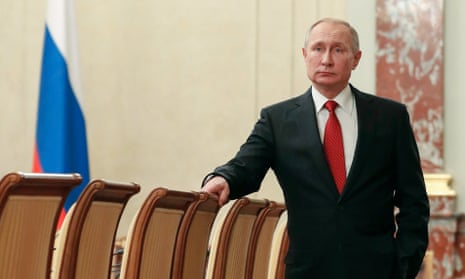Wednesday may prove to be one of the most important days in the political history of post-Soviet Russia. During the last 10 minutes of his annual state-of-the-nation speech, Vladimir Putin announced a series of proposals to reform Russia’s constitution that seem to lay out the roadmap for his own political future after 2024. System-wide change is on the horizon for Russia, but the country’s most important political figure is likely to remain central to it all for years to come.
Putin’s proposed constitutional reforms would reshape the balance of power between the legislature (the federal Duma) and the executive (the president), vesting authority for appointing and confirming the prime minister and cabinet in the Duma and limiting the president to two terms in office. While Russia would remain a presidential republic, elements of the “super-presidential” system – one that concentrates almost all political decision-making in the hands of the president – established by Boris Yeltsin in 1993 after his violent confrontation with parliament – will be significantly altered.
Putin is intentionally weakening the office that has become synonymous with him over the last 20 years. Future presidents of Russia will not be able to sit out a term to run again, as Putin did in 2008-2012, in order to comply with constitutional term limits. Nor will the president alone decide the composition of the government. Putin is transforming the presidency because he no longer intends to occupy the office.
Speculation about Putin’s future abounded even before he was re-elected to his fourth term as president in March 2018. No one expected that the longest-serving Russian leader since Stalin (a record he broke in 2017) would gracefully enter retirement when he reached his term limit in 2024. But the path forward was unclear. Would he again become prime minister, as he did in 2008? Would he eliminate presidential term limits altogether, like Belarus’s president, Alexander Lukashenko, who has been re-elected to his post for over 25 years? Would Putin follow the example of central Asian presidents who have brought in their children to succeed them, or created offices above the presidency to permanently occupy?

All of these options seemed unlikely. The previous switch between president and prime minister contributed to anti-government feeling among Russians that ultimately led to months of protests in 2011. Putin has purposely kept his daughters out of the public spotlight, making them improbable successors. And few expected Putin to make himself “leader of the nation”, like Kazakhstan’s Nursultan Nazarbayev.
Putin’s proposal to make the presently advisory state council – which he established in 2000 and heads – into a government body by enshrining it in the constitution hints at his plans for himself. Empowering this institution and perhaps making it his seat of power, while simultaneously weakening the presidency, would allow Putin to remain central to the political system for years to come. He may be using China’s state council, which is one of the three main branches of power, along with the Communist party and the People’s Liberation Army, as a template.
Despite the fact that Putin will remain, the changes proposed may have long-term positive effects on Russia’s political system. However cynical Putin’s efforts to reallocate some of the powers of the president to parliament, a stronger parliament is a good thing for Russia.
Today the Duma is a rubber-stamp institution that performs the only function left to it: to speedily approve government legislation with little debate. Members do not make or influence policy, and voters are disconnected from the political process because their representatives have little interest in serving constituents. The entire chain of representative democracy from voter to legislation is broken.
But if the Duma becomes more powerful relative to the president, legislative elections will become more competitive. This is not because of some inherent democratic spirit but rather political self-interest. People who want to make a difference will be attracted to institutions that give them that opportunity. Greater competition for votes will incentivise politicians to make more direct appeals to voters.
Competition will also weed out bad or incompetent candidates. Few members of the Kremlin’s party of power – United Russia – know how to run a campaign because they have never been forced to compete, winning their seats thanks to fraud and manipulation. Protests and elections last summer in Moscow demonstrated that Russians have an appetite for high quality and grassroots political campaigns.
Putin, now 67, will remain the most powerful political actor in Russia for years to come. But he will eventually make his exit – and if the reforms announced take place, he will leave behind a political system that can provide opportunities for the kind of real political competition that has been absent from Russia for the last 20 years.
